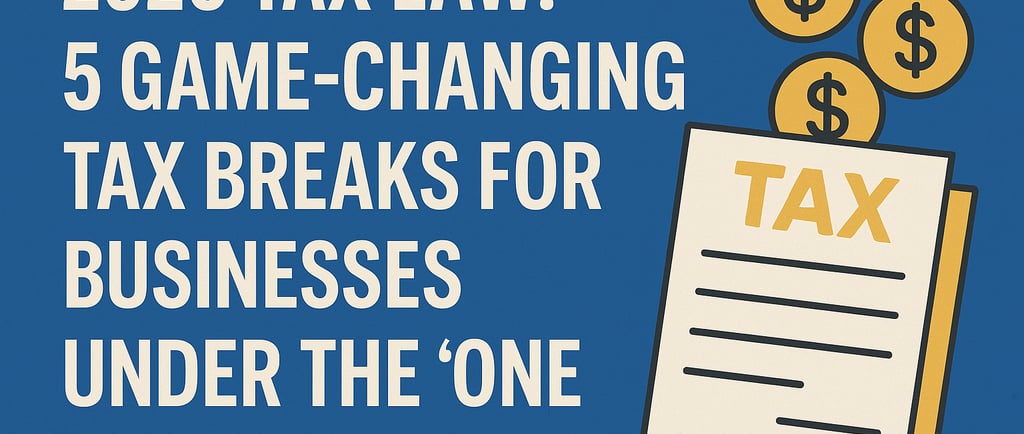2025 Tax Law: 5 Game‑Changing Tax Breaks for Businesses Under the “One Big Beautiful Bill
Discover how the 2025 tax law overhaul impacts your business. In this post, we break down the top 5 business tax benefits from the One Big Beautiful Bill Act—including the permanent 20% QBI deduction, 100% bonus depreciation, restored R&D expensing, expanded Section 179 limits, and enhanced employer tax credits. Whether you're a small business owner, startup founder, or CFO, this guide will help you maximize your tax savings and plan for growth in 2025 and beyond.


The One Big Beautiful Bill Act—signed into law on July 4, 2025. The law permanently extends key provisions from the 2017 Tax Cuts and Jobs Act (TCJA) while introducing powerful new incentives that encourage capital investment, R&D, hiring, and long-term planning.
If you own or operate a business, here’s what you need to know about how the 2025 tax law could lower your tax bill and fuel your growth.
✅ 1. Permanent 20% QBI Deduction for Pass-Throughs
The Qualified Business Income (QBI) deduction, also known as the Section 199A deduction, allows eligible business owners to deduct up to 20% of their net qualified income. This applies to pass-through entities like:
Sole proprietorships
S-Corporations
Partnerships
LLCs taxed as any of the above
What’s Changed in 2025:
The deduction is now permanent, eliminating the previous 2025 sunset provision and offering long-term tax planning certainty.
Income phase-in thresholds were raised to $75,000 (single) and $150,000 (joint).
A new minimum deduction of $400 applies for any business earning at least $1,000 in QBI.
📌 Example: If your LLC earns $100,000 in qualified income, you can deduct up to $20,000—potentially saving $4,400+ in federal taxes (assuming a 22% rate).
💻 2. 100% Bonus Depreciation & Section 179 Enhancements
Bonus depreciation is back—and here to stay. Under the new law:
Businesses can immediately write off 100% of the cost of qualifying assets such as computers, machinery, furniture, vehicles, and certain improvements.
This provision is now permanent, rather than phasing down as originally scheduled.
In addition, Section 179 expensing was enhanced:
The deduction limit was increased to $2.5 million (up from $1.25 million).
The phase-out threshold was raised to $4 million, expanding access to larger businesses.
📌 Use Case: Tech firms, manufacturers, and service providers can upgrade servers, leasehold improvements, or delivery vehicles—and deduct the entire cost in the first year.
🧪 3. R&D Expensing Fully Restored (Retroactive to 2022)
For years, businesses were required to amortize domestic research and development (R&D) expenses over 5 years. That’s now reversed.
The 2025 tax bill fully restores immediate R&D expensing for U.S.-based innovation costs.
The change is retroactive to tax year 2022, meaning eligible businesses can amend past returns to recover cash today.
📌 Impact: Startups, SaaS companies, and product development teams can deduct costs like prototype development, testing, and engineer salaries all in the same year they’re incurred.
👨👩👧 4. Expanded Employer Tax Credits: Paid Leave & Child Care
Supporting working families is now tax-efficient for employers.
a. Paid Family & Medical Leave Credit:
Previously temporary, the credit for paying employees during family or medical leave is now permanent.
Employers can claim up to 25% of wages paid during qualified leave periods.
b. Child Care Credit for Employers:
Beginning in 2026, employers can claim a credit of:
40% of up to $500,000 in child care facility expenses
Or 50% of up to $600,000, if meeting specific quality benchmarks
📌 Real Benefit: This credit is especially helpful for companies looking to support parents in the workplace and improve retention.
📈 5. Qualified Small Business Stock (QSBS) Expansion
The rules for Qualified Small Business Stock (QSBS) under Section 1202 got a major upgrade, benefiting founders, angel investors, and startup employees.
Key Changes:
The gross asset limit increased from $50M to $75M.
A tiered capital gains exclusion structure was introduced:
50% exclusion after 3 years
100% exclusion after 5 years, up to $10M or 10x basis
📌 Translation: Early-stage businesses now have more flexibility to raise capital while offering tax-advantaged equity to investors and employees.
⚠️ BONUS: Clean-Energy Credits Set to Expire
If your business benefits from green incentives (solar, EV fleets, energy-efficient improvements), be aware that many of these tax credits are phasing out by the end of 2025–2026. Now is the time to complete clean energy upgrades before the incentives vanish.
💼 Final Thoughts for Business Owners
The 2025 tax law offers an extraordinary opportunity to:
Lock in permanent tax savings
Reclaim missed deductions (like R&D from 2022–2024)
Invest confidently in your people, equipment, and future
At Acctually, we specialize in helping growing businesses navigate complex tax laws while aligning your tax strategy with your business goals. Whether you’re a startup founder or running an established firm, we’ll make sure you get the maximum benefit from the new law.
📣 Ready to Get Started?
Let’s talk.
📅 Book a free strategy session with an Acctually tax expert and discover how to make the 2025 tax law work for you.
📧 Email us at hello@acctually.com
🌐 Visit us at https://acctually.com/
📞 Call us at (646) 543-4916
